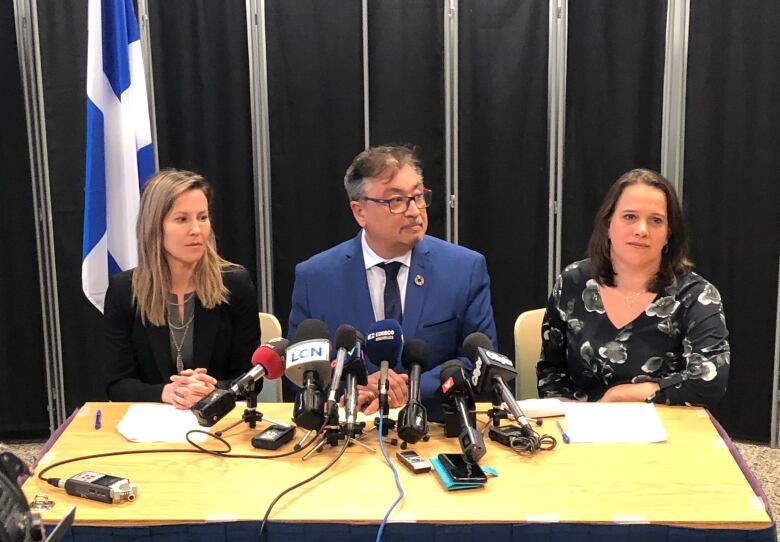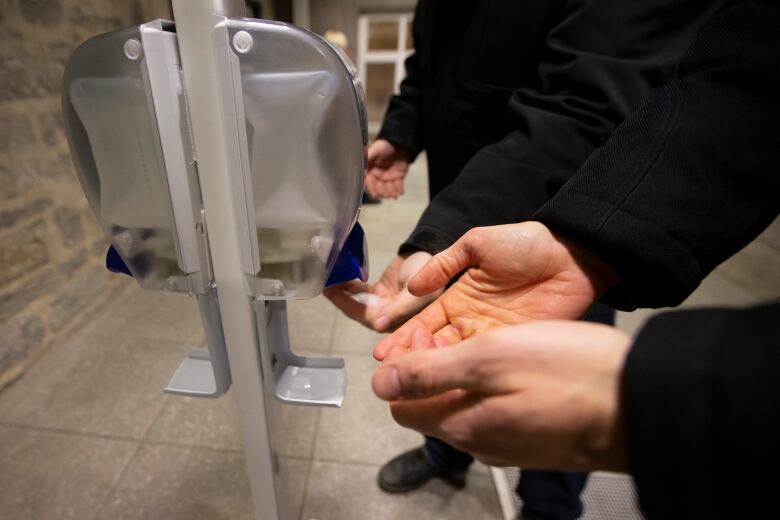COVID-19 patient took Montreal-area public transit, health officials say
Public health provides complete list of Metros and busses used

A person who tested positive for COVID-19 took public transit in the Montreal region including a bus on the South Shore and two Metro lines several timesover a two-week period, Quebec public health officials announced Tuesday.
Horacio Arruda, Quebec's director of public health, says there has been no reported case of the virus being transmitted locally, but the province's fourth confirmed COVID-19 patient rode the Montreal Metro and buses on the South Shore on Feb. 24 and March 6.
Speaking during a hastily callednews conference Tuesday afternoon, Arruda said health authorities have been able to narrow down the places and times that the patient visited while they werecontagious.
The patient travelled on Montreal's Metro and a South Shore bus as recent as March 6. People who used the same routes during that time should monitor for symptoms until March 20, public health says.
As for those who may have shared public transit with the patient on Feb. 24, anyone infectedwould have shownsymptoms by Monday.
Locations, dates and hours of exposure risk
A complete list of the times and places the patient travelled hasbeen posted online.It is as follows:
- Feb. 24, 2 p.m. to 2:30 p.m.
From Longueuil station to Berri-UQAM to Champs-de-Mars station
(Watch for symptoms until March 9)
- Feb. 24, 3:15 to 3:45 p.m.
From Champs-de-Mars station to Berri-UQAM to Longueuil station
(Watch for symptoms until March 9)
- Feb. 24, 3:50 p.m. to 5 p.m.
From Longueuil station on RTL Bus 88 in the Mountainview direction
(Watch for symptoms until March 9)
- March 6, 9:30 a.m. to 10 a.m.
From Longueuil station to Berri-UQAM to Champs-de-Mars station
(Watch for symptoms until March 20)
- March 6, 10:50 a.m. to 11:20 a.m.
From Champs-de-Mars station to Berri-UQAM to Longueuil station
(Watch for symptoms until March 20)
- March 6, 11:30 a.m. to 12:20 p.m.
From Longueuil station to RTL Bus 88 in the Mountainview direction
(Watch for symptoms until March 20)

JulieLoslier, director of Montrgie's public health,said the 88 bus line on Montreal's South Shore is one of the area's busiest routes. And, she said, the Metro is quite busy as well. Given that, it is difficult to gauge how many people may have come into contact with the patient.
"What we want is to be vigilant," she said, encouraging anybody who was on the bus or Metro around the same time as the patient to monitor for symptoms such as fever, cough and difficulty breathing.
Those who may have come into contact with the patient and showsymptomsshould call 811, Arruda said.
"We don't want to make people panic," he said."We just want to give the information we have."
That way, he explained, if somebody does actually contract the virus, they can be aware of the risk and follow the appropriate steps with public health.
Along withretracing the steps of the fourth patient, health authorities have been looking into the contact Quebec's fifth presumptive case had with family, friends and public but, overall, Arruda said "the risk is low. It is very low."
Once transmission of the virus becomes more common in Quebec, he said, the province will not be retracing patients' steps and releasing the information.
Quebec has four confirmed cases of COVID-19 and one presumptive. In every case, the patient was returning from a trip overseas. Arruda said there have been no local transmissions of the virus yet and the province is continuing to put in place various strategies and protocols to contain its spread.
STMincreases cleaning of Metro
Last week, Montreal's public-transit agency (STM) announced it is increasing the frequency that it cleans its metro cars. The STM is also distributing disinfectant wipes to employees.
The agency said it is staying in touch with the province's health authorities as it awaits further instructions.
STM spokesperson Philippe Dry is remindingpassengers that the risk of infection is still low in the province.
"That said, I'd like to remind people that authorities recommend that, if clients have symptoms like cough or fever, to stay home, call Info-Sant and not use public transit,"Drysaid Wednesday.
The STM usually washes the cars' floors every few days, but a new train-cleaning program is gradually being introduced to ensure the interiors, including the grab bars, are fully washed within seven days.
But disinfecting high-traffic, public surfaces like handrails and ticket dispensers on a regular basis isn't going to stop the coronavirus in its tracks as it can potentially survive for several days on certain surfaces, according to Dr. Yves Jalbert, deputy director of public health protection for Quebec.
"Anybody can go into the subway and touch things. Even if you washed it a half hour ago, it's not effective anymore," said Jalbert last week.
"That's why we insist on handwashing."
Mayor Plantesays city is getting ready for outbreak
Arruda's announcement comes after Montreal Mayor Valrie Plante took to Twitter earlier in the day, saying the COVID-19 situation is under control in the city, but the "global spread of the virus is very real."
That's why Montreal's Centre de securite civile (CSC) is "going into alert mode," she said.
The CSC is collaborating with the agglomeration's civil protection organization (OSCAM) in preparing and deploying a plan to ensure "the continuity of city services to Montrealers in the event that the situation deteriorates," Plante said.

And Montreal's Sainte-Justine Hospital has established stricter rules for its staff and doctors than the Public Health Agency of Canada requires.
In an email sent to the 5,500 employees and 500 doctors on Monday, the hospitalasked doctors to stay in Canada and to not report to work if they've returned from 11 countries, including regions of France and United States.
Thefederal governmentadvises the public against non-essential travel to three countries to China, Iran and northern Italy.












_(720p).jpg)


 OFFICIAL HD MUSIC VIDEO.jpg)
.jpg)



























































































